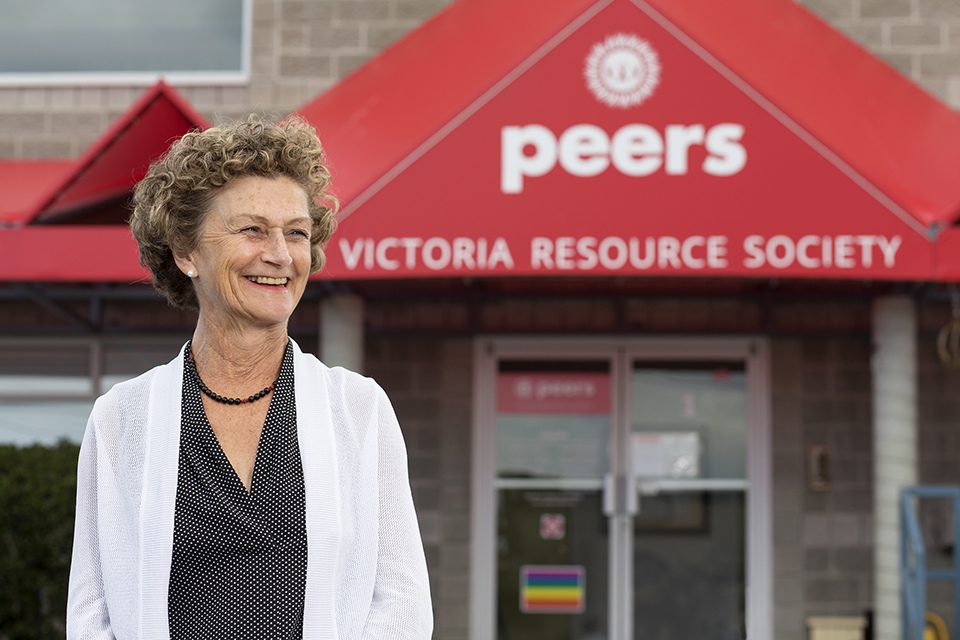Sociologist wins national prize for reducing inequity and stigma

From advocating for the recognition of Indigenous and non-Indigenous midwives, to working with street-involved youth, to empowering sex workers to become their own health advocates, sociologist Cecilia Benoit has made vital contributions to the advancement of class, race and gender equality in Canada.
A scientist with the Canadian Institute for Substance Use Research (CISUR) and professor emerita of sociology at the University of Victoria has been awarded the 2020 Killam Prize in Social Sciences from the Canada Council for the Arts.
Benoit, who is of Qalipu First Nation of Newfoundland heritage, uses her research to shine a light on the social inequities and other factors that contribute to stigma and discrimination. Her research projects have championed the inclusion of the voices and contributions of often-overlooked community members. Benoit’s midwifery research in the 1990s, for example, provided evidence that led to the legalization and public funding of midwifery in various Canadian jurisdictions, and honoured women’s work in early settler and Indigenous communities.
“It is amazing that in my lifetime, midwifery has moved from a stigmatized and banned activity to a valuable healthcare service in its own right and publicly funded in most regions,” Benoit says. “A lot remains to be done to improve the working conditions of midwives in Canada, but some fundamental rights have been recognized.”
She co-led a longitudinal study of street-involved youth in Victoria with the Victoria Youth Clinic (now known as Foundry Victoria). The recommendations of the young people interviewed for the study were given prominence when the clinic opened in 2018. Benoit also helped establish and evaluate Victoria’s Her Way Home program, which provides health care and social supports for pregnant and parenting women with a history of substance use.
Much of Benoit’s later career work has been devoted to shedding light on the lives of sex workers. Her Understanding Sex Work projects involved interviews with 700 people working in or associated with the sex industry across Canada, including intimate partners of sex workers, clients, managers, and sex workers themselves. She has looked at how recent changes to the Canadian Criminal Code impacted sex workers’ health and safety, and worked with community agencies to create a peer-to-peer health advocacy program in Victoria that is being piloted in other national and international jurisdictions.
Benoit says that sex workers face social and economic injustices daily and their challenges are being compounded by the COVID-19 pandemic as they struggle with job loss due to the banning of in-person services and decreased access to community outreach. “In light of their exclusion from Canada’s safety net of programs such as Employment Insurance, as well as CERB and our government’s other recent emergency financial responses, sex workers have mobilized in their own communities to create relief funds to help pay for basic necessities,” she says. “Their fundraising efforts are helping but are inadequate and many needs are going unmet. Sex workers should be included in public responses to COVID-19 with the immediate establishment of a special government crisis fund to help keep them afloat during these difficult times.”
For her Pierre Elliot Trudeau Foundation Fellowship project Beyond the ‘Missing Women Inquiry’: Empowering Sex Workers as Social Justice Advocates, Benoit is working with eight community organizations to develop training programs to help local sex workers support each other and advocate for their rights.
“Cecilia Benoit’s pioneering research aimed at decreasing gender and racial inequities and empowering women and Indigenous peoples in Canada is today at the forefront of the public consciousness. Our academic institutions and political bodies recognize her findings as needing urgent attention,” says Susan McDaniel, director of the Prentice Institute for Global Population and Economy at the University of Lethbridge and adjunct professor of sociology at UVic.
Benoit is the third UVic Killam Prize winner including James Tully (2011) and John Borrows (2017). Killam Prize winners receive a $100,000 prize.
A media kit containing high-resolution photos of Benoit is available on Dropbox.
-- 30 --
Photos
Media contacts
Cecelia Benoit (CISUR) at 250-477-1864 or cbenoit@uvic.ca
Amanda Farrell-Low (CISUR Communications Officer) at 250-472-5445 or farlow@uvic.ca
Suzanne Ahearne (University Communications + Marketing) at 250-721-6139 or sahearne@uvic.ca

